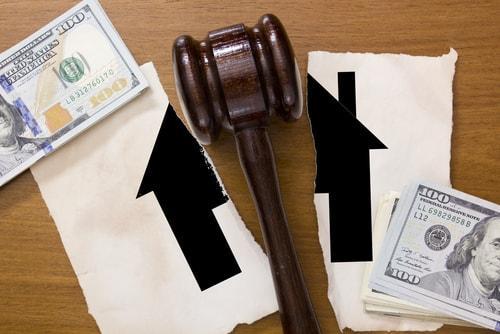Recent Blog Posts
How to Have a Healthy Illinois Divorce
 Marriage is not easy. It takes a lot of work, effort, and persistence to make a marriage work, but sometimes it does not matter how hard you try -- you are destined to divorce. According to the National Survey of Family Growth, more than 20 percent of first marriages end in divorce within the first five years and 48 percent of marriages end before they hit 20 years. Divorce is an emotionally stressful and trying process, but sometimes it is one of the best things you can do for you and your spouse. Instead of making life as difficult as possible for both you and your soon-to-be ex, you should try focusing on making your split as healthy and smooth as possible.
Marriage is not easy. It takes a lot of work, effort, and persistence to make a marriage work, but sometimes it does not matter how hard you try -- you are destined to divorce. According to the National Survey of Family Growth, more than 20 percent of first marriages end in divorce within the first five years and 48 percent of marriages end before they hit 20 years. Divorce is an emotionally stressful and trying process, but sometimes it is one of the best things you can do for you and your spouse. Instead of making life as difficult as possible for both you and your soon-to-be ex, you should try focusing on making your split as healthy and smooth as possible.
Cooperate and Communicate
When you begin the divorce process, you will probably feel a flood of emotions, like anger, grief, and depression. When emotions are running this high, it is easy for you to do and say things that can negatively affect the divorce process. Remember, your emotions are valid, but how you handle them is important. Make sure you maintain an open line of communication with your spouse and remember that cooperation is key.
Common Reasons Couples Divorce
 Nothing lasts forever and in this day and age, marriages are included in that saying. According to the Centers for Disease Control and Prevention (CDC), nearly 36 percent of couples experience some form of marital disruption by their tenth year of marriage. By the time couples have been married for at least 20 years, that percentage jumps to 53 percent. Though those numbers seem high, some researchers have actually said that the U.S. divorce rate is declining. So why is the rate of marital disruption so high? Here are a few of the most commonly cited reasons that couples get a divorce. Marrying at a Young Age You have heard it before -- getting married too young is not a good idea. Many studies have shown that couples who get married when they are teens or young adults tend to have a higher divorce rate than couples who get married in their late 20s or early 30s. Infidelity This one is perhaps one of the more well-known reasons for getting a divorce. Cheating on your spouse can be the kiss of death for a marriage. When one spouse cheats on another, the trust between the two of them is broken and if you are already experiencing a weak sense of trust, cheating may be the end. Addiction and/or Substance Abuse Another commonly-cited reason for divorce is one spouse’s drug or alcohol use. When you are addicted to something, it consumes your mind and life. A partner who is addicted to drugs or alcohol can destroy the family and be the last straw for some couples. Financial Problems Many couples therapists say that one of the main reasons couples seek therapy is for financial issues. Many couples also say that money problems were the reason for their divorce. When couples do not agree on the way money should be handled, arguments can become heated and divorces can result.
Nothing lasts forever and in this day and age, marriages are included in that saying. According to the Centers for Disease Control and Prevention (CDC), nearly 36 percent of couples experience some form of marital disruption by their tenth year of marriage. By the time couples have been married for at least 20 years, that percentage jumps to 53 percent. Though those numbers seem high, some researchers have actually said that the U.S. divorce rate is declining. So why is the rate of marital disruption so high? Here are a few of the most commonly cited reasons that couples get a divorce. Marrying at a Young Age You have heard it before -- getting married too young is not a good idea. Many studies have shown that couples who get married when they are teens or young adults tend to have a higher divorce rate than couples who get married in their late 20s or early 30s. Infidelity This one is perhaps one of the more well-known reasons for getting a divorce. Cheating on your spouse can be the kiss of death for a marriage. When one spouse cheats on another, the trust between the two of them is broken and if you are already experiencing a weak sense of trust, cheating may be the end. Addiction and/or Substance Abuse Another commonly-cited reason for divorce is one spouse’s drug or alcohol use. When you are addicted to something, it consumes your mind and life. A partner who is addicted to drugs or alcohol can destroy the family and be the last straw for some couples. Financial Problems Many couples therapists say that one of the main reasons couples seek therapy is for financial issues. Many couples also say that money problems were the reason for their divorce. When couples do not agree on the way money should be handled, arguments can become heated and divorces can result.
Changes Proposed for Illinois Parenting Time Guidelines
 One of the biggest stressors that many divorcing couples have during -- and after -- their divorce is the children. Many parents worry that a divorce will put too much of a strain on their children, while other parents worry about having enough time with their children. While it is true that a divorce can be difficult for the entire family, children can be more flexible and adaptable than adults. It is generally understood that children do best after a divorce when both of their parents are present and active in their lives. While this is true, many divorced families find that they do not come out of the divorce with the parenting plan they wanted. A new bill, called the “Equal Parenting Time” bill was introduced in Illinois recently, which aims to make it so that more parents have equal parenting time with their children after an Illinois divorce. Current Parenting Time Guidelines
One of the biggest stressors that many divorcing couples have during -- and after -- their divorce is the children. Many parents worry that a divorce will put too much of a strain on their children, while other parents worry about having enough time with their children. While it is true that a divorce can be difficult for the entire family, children can be more flexible and adaptable than adults. It is generally understood that children do best after a divorce when both of their parents are present and active in their lives. While this is true, many divorced families find that they do not come out of the divorce with the parenting plan they wanted. A new bill, called the “Equal Parenting Time” bill was introduced in Illinois recently, which aims to make it so that more parents have equal parenting time with their children after an Illinois divorce. Current Parenting Time Guidelines
Tips to Help Parenting Time Exchanges Go Smoothly
 When you have children and you are getting a divorce, there are many things you must worry about. Before you can finalize your Illinois divorce, you and your spouse must come to an agreement on a parenting plan, you must determine who gets child support and how much that support will be and you also have to figure out how the children will spend time between you and your spouse. Most of the time, parents will have similar parenting time schedules, as long as there are no extenuating circumstances that would require the children to spend more time with one parent. Parenting time exchanges can be stressful for both you and your children, but they can be easier with a little effort. Here are a few ways you can help your parenting time exchanges go by a little smoother. Make a Visible Schedule for Your Children Sometimes, it can be difficult for children to adjust to changes, especially when they are happening in their family. Making a visible schedule for your children to look at can help ease some of the stress and anxiety that your children may be feeling. Communicate with Your Ex-Spouse You should make sure you keep an open line of communication with your ex-spouse when you have children. Though you and your spouse’s romantic relationship is over, you will always have a connection to each other through your children. In order to avoid any uncertainties or confusion, keep in contact with your child’s other parent. Meet in a Neutral Place If you and your spouse have had a hostile relationship, it could be beneficial for everyone involved to meet in a public place to exchange the children. Meeting on neutral territory can help deter any arguments or altercations that may take place. Try to Be on Time It happens -- sometimes you are just late, no matter how hard you try to be on time. As soon as you realize that you are running behind schedule, let the other parent know so they do not think you are just being inconsiderate of their time. Hire a Skilled DuPage County Parenting Time Lawyer
When you have children and you are getting a divorce, there are many things you must worry about. Before you can finalize your Illinois divorce, you and your spouse must come to an agreement on a parenting plan, you must determine who gets child support and how much that support will be and you also have to figure out how the children will spend time between you and your spouse. Most of the time, parents will have similar parenting time schedules, as long as there are no extenuating circumstances that would require the children to spend more time with one parent. Parenting time exchanges can be stressful for both you and your children, but they can be easier with a little effort. Here are a few ways you can help your parenting time exchanges go by a little smoother. Make a Visible Schedule for Your Children Sometimes, it can be difficult for children to adjust to changes, especially when they are happening in their family. Making a visible schedule for your children to look at can help ease some of the stress and anxiety that your children may be feeling. Communicate with Your Ex-Spouse You should make sure you keep an open line of communication with your ex-spouse when you have children. Though you and your spouse’s romantic relationship is over, you will always have a connection to each other through your children. In order to avoid any uncertainties or confusion, keep in contact with your child’s other parent. Meet in a Neutral Place If you and your spouse have had a hostile relationship, it could be beneficial for everyone involved to meet in a public place to exchange the children. Meeting on neutral territory can help deter any arguments or altercations that may take place. Try to Be on Time It happens -- sometimes you are just late, no matter how hard you try to be on time. As soon as you realize that you are running behind schedule, let the other parent know so they do not think you are just being inconsiderate of their time. Hire a Skilled DuPage County Parenting Time Lawyer
Tips to Help You Deal with a High-Conflict Divorce
 You would not think so, but some divorces are amicable and calm, mostly because the divorce was not contested and both spouses were in agreement about issues pertaining to the divorce. Though that is the perfect idea of a divorce, we do not live in a perfect world and more often than not, there is some sort of fighting and disagreement during the divorce process. In severe cases, the divorcing couple cannot stand to be in the same room as each other, making for a very high-conflict divorce. If you are experiencing a high-conflict divorce, here are a few tips you can use to help you cope.
You would not think so, but some divorces are amicable and calm, mostly because the divorce was not contested and both spouses were in agreement about issues pertaining to the divorce. Though that is the perfect idea of a divorce, we do not live in a perfect world and more often than not, there is some sort of fighting and disagreement during the divorce process. In severe cases, the divorcing couple cannot stand to be in the same room as each other, making for a very high-conflict divorce. If you are experiencing a high-conflict divorce, here are a few tips you can use to help you cope.
Create Boundaries
The first step in dealing with a high-conflict spouse and a high-conflict divorce is setting boundaries for the new relationship you will have. Whether these boundaries are with your co-parenting relationship, the communication between the two of you or any other issue, boundaries are essential. Create them and stick to them.
Parental Alienation and How It Can Affect Your Divorce
 When you are going through a divorce, it can pretty much turn your life upside down. Though you may experience some stress and anger, there are ways that you can combat that stress and deal with your anger in a healthy way. Unfortunately, this is not what happens in all divorces. In some cases, one parent may have so much hate for the other parent that it overcomes the love that they have for their children. This is when parental alienation usually appears and it can be detrimental to your child’s wellbeing.
When you are going through a divorce, it can pretty much turn your life upside down. Though you may experience some stress and anger, there are ways that you can combat that stress and deal with your anger in a healthy way. Unfortunately, this is not what happens in all divorces. In some cases, one parent may have so much hate for the other parent that it overcomes the love that they have for their children. This is when parental alienation usually appears and it can be detrimental to your child’s wellbeing.
What Is Parental Alienation?
Parental alienation occurs when one parent tries to turn the children against the other parent. Most of the time, this happens when one parent is so angry at the other parent that they use deprecating comments, false allegations, and bribery to try to get the child to turn against the parent. Both the mother and the father are equally as likely to be the alienated and alienating parent. Typically, parental alienation occurs in families in which one or both parents have a personality disorder, but parental alienation can happen in any family.
Illinois Child Support Modification Requirements
 A common outcome of divorce when you have children and you are their primary caregiver is child support. Many families depend on these support payments each month from the other parent to ensure that the children are fed, clothed and have everything that they need. Once a child support order is entered, it cannot be modified or reviewed for at least three years -- unless there is a significant and substantial change in circumstances. A significant change in the family’s circumstances is actually the most common reason why a child support modification may be granted, although they can also be modified if the child support orders do not address healthcare for the child or if the child support orders deviate from the support guidelines.
A common outcome of divorce when you have children and you are their primary caregiver is child support. Many families depend on these support payments each month from the other parent to ensure that the children are fed, clothed and have everything that they need. Once a child support order is entered, it cannot be modified or reviewed for at least three years -- unless there is a significant and substantial change in circumstances. A significant change in the family’s circumstances is actually the most common reason why a child support modification may be granted, although they can also be modified if the child support orders do not address healthcare for the child or if the child support orders deviate from the support guidelines.
What Constitutes a Significant Change in Circumstances?
The Illinois Marriage and Dissolution of Marriage Act has guidelines for almost any issue that may arise during an Illinois divorce. In the section about child support, the Act defines what the courts would consider to be a significant change in circumstances. In Illinois child support modification cases, a significant change in circumstances can include:
Handling College Expenses After an Illinois Divorce
 When you get a divorce and you have children, chances are there will be some sort of child support involved. In Illinois, child support ends when the child turns 18 or until the child graduates from high school -- whichever comes later. Even though your child has graduated from high school, that does not mean that your support for the child has ended. If your child decides to pursue some type of post-secondary education, you are responsible for contributing to their education. This type of support is considered to be “non-minor support” and lasts until the child turns 23. It is best if you and your spouse come to an agreement as to how college expenses will be handled, but a judge can allocate college expenses if need be.
When you get a divorce and you have children, chances are there will be some sort of child support involved. In Illinois, child support ends when the child turns 18 or until the child graduates from high school -- whichever comes later. Even though your child has graduated from high school, that does not mean that your support for the child has ended. If your child decides to pursue some type of post-secondary education, you are responsible for contributing to their education. This type of support is considered to be “non-minor support” and lasts until the child turns 23. It is best if you and your spouse come to an agreement as to how college expenses will be handled, but a judge can allocate college expenses if need be.
Covered Expenses
The main thing most people think about when discussing college expenses is tuition. While that is typically the most expensive expense, it is not the only expense that is covered under the Illinois Marriage and Dissolution of Marriage Act. Other expenses that you may be responsible for include:
New Illinois Maintenance Laws for 2019
 Divorce is always complicated, no matter how you look at it. There are many issues you must settle before you can finalize your divorce, one of those being the issue of alimony or spousal maintenance. In Illinois divorce cases, spousal maintenance is never guaranteed -- some people will ask for maintenance and not receive it, some will never even bring the issue up and some are actually awarded maintenance when they seek it. For some people, maintenance is a necessity to help them survive, at least for the first couple of months after the divorce. Illinois spousal maintenance laws changed starting January 1, 2019. These laws affect the way spousal maintenance is calculated, so it is important that you understand the changes if you have not yet finalized your divorce.
Divorce is always complicated, no matter how you look at it. There are many issues you must settle before you can finalize your divorce, one of those being the issue of alimony or spousal maintenance. In Illinois divorce cases, spousal maintenance is never guaranteed -- some people will ask for maintenance and not receive it, some will never even bring the issue up and some are actually awarded maintenance when they seek it. For some people, maintenance is a necessity to help them survive, at least for the first couple of months after the divorce. Illinois spousal maintenance laws changed starting January 1, 2019. These laws affect the way spousal maintenance is calculated, so it is important that you understand the changes if you have not yet finalized your divorce.
Old Maintenance Laws
Prior to 2019, spousal maintenance was calculated by taking 30 percent of the payer’s income and subtracting 20 percent of the receiver’s income. This was a valid calculation for any couple whose combined annual income was less than $500,000, though the total maintenance awarded was not able to be more than 40 percent of the couple’s combined income when adding the payment to the receiver’s income.
Three Key Issues About Property Division in an Illinois Divorce
 Divorce brings with it a plethora of things that you must settle before you can finalize your divorce. Just one of the many things involved in a divorce is property division. When you are married, you and your spouse share almost every aspect of your lives together. Though this makes your life easier while you are together, it can make for a tough time when you get a divorce. Property division can often turn even the most peaceful of divorces into screaming matches. Here are a couple of things that you should know about Illinois property division before you settle your divorce:
Divorce brings with it a plethora of things that you must settle before you can finalize your divorce. Just one of the many things involved in a divorce is property division. When you are married, you and your spouse share almost every aspect of your lives together. Though this makes your life easier while you are together, it can make for a tough time when you get a divorce. Property division can often turn even the most peaceful of divorces into screaming matches. Here are a couple of things that you should know about Illinois property division before you settle your divorce:
Illinois Is an “Equitable Division” State
In the state of Illinois, property division is divvied up in a way that is equitable, rather than equal. This means that all factors will be looked at before determining which spouse gets which property. This also means that property division will not always be 50/50. If the judge feels that one spouse should receive more property than the other, then he can award that spouse more.









